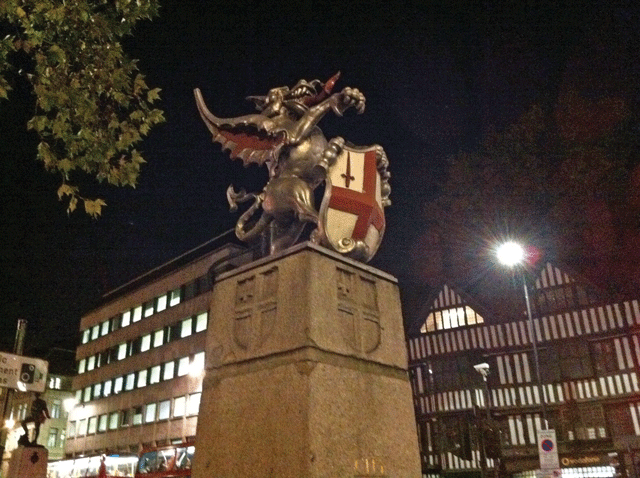They gilt this City: In the City of London, business really does control the mayor and council. By law.
Darryl Chamberlain | Tuesday 8 November, 2011 10:24

You can see them standing guard on the Victoria Embankment, and by the Tower of London. There’s a fine pair outside Chancery Lane Tube, and a great big one at the end of the Strand.
City of London’s dragons mark the border of a part of the capital that’s resisted change for centuries. Businesses have more say than residents, and the City of London Corporation retains special privileges under law.
Since Victorian times, reformers have sought to clip its wings – but have found the City’s firepower too much for them. But have the dragons met their match in the Occupy London protesters?
Criticised by right-wingers for having no definite agenda, the St Paul’s campers came up with a list of demands 12 days into their occupation. It included sweeping reforms to how the Square Mile is run, including abolition of the Lord Mayor.
The City Corporation does all the normal things a local council does, like collecting the bins, fixing the roads, and sweeping up the rubbish. But its writ extends beyond the City, including running great open spaces like Epping Forest. It even has its own police force – separate from the Met, who have long coveted the City Police’s patch – as well as the Lord Mayor and his show.
As a reminder of its influence, the City Remembrancer attends Parliament, sits opposite the Speaker, and deals with government, royalty, and the great unwashed across the Thames at City Hall.
But what the City does best revolves around money. Some 450 international banks are based in the Square Mile, and the City speaks up for the UK’s financial industry. The corporation has a fair bit of money itself. About a third of its wealth is in a private fund – City’s Cash – which is thought to be worth about £1 billion, built up over centuries from property holdings across the capital and across the globe.
So, do the locals have a say in what happens to all this loot? Only a little one.
The Square Mile is home to 9,000 people—most of them live in the Barbican or Golden Lane estates. They get to vote in City elections—here, they choose common councilmen, aldermen and sheriffs, none of which usually represent political parties—but are outnumbered by more than 24,000 business votes. The bigger your business, the more votes you get.
Fair? The City Corporation insists that with 340,000 people working there within its borders, businesses should have a say on their behalf.
But to stand in an election, you have to be a “freeman” of the City and that means being approved by the aldermen, who would have already been approved themselves. You can avoid this process if you’ve been on the City’s electoral roll for a year. So the pressure to tear down the walls is coming from outside.
Labour MP John McDonnell has campaigned for reform for years, calling the City “the last rotten borough”. His own party planned to abolish it in the 1990s, but the promise went the same way as the ones to renationalise railways and keep higher education free. Local Labour activists in the City stood for the Common Council in 2009, although without success.
Green mayoral candidate Jenny Jones has pledged to abolish the “medieval institution”, and thinks the City’s Cash – whose annual income she estimates at £100m – should be run by City Hall for the whole capital’s benefit.
Even Conservative Brian Coleman has demanded reform, saying the City is mired in “vicious personality politics”.
Campaigners for reform have been given a boost by Nicholas Shaxson’s book Treasure Islands. He claims the ancient status of the City has provided cover for all kinds of financial wrongdoing – including the reckless dealing which helped bring about the current crisis.
With the Occupy London protest already having seen off opposition from St Paul’s Cathedral, the City is keen to move them on. Not least because it’s the Lord Mayor’s Show on 12 November – and they won’t want tents in the way of the parade. Campaign group Reclaim The City is already planning protests for the big day.
In some ways, the City is no more a “rotten borough” than some London town halls, dominated by small cliques of party hacks elected on pitiful turnouts. But while the City may be above the bullying, showboating and complacency that characterises much local London politics, the 32 boroughs generally don’t have multi-billion pound reserves – or huge clout in the highest offices of power.
How much longer can the City hold out? It’s proved pretty resillient so far. But we’ve heard very little so far from those 9,000 people who live within its borders. With the current mood, if they spoke up, they might find they have more power than they think.
(Article amended to include the fact that it is possible to stand for election in the City without having been approved as a “freeman”.)
Contact this writer at darryl.charmberlain@snipelondon.com
Snipe Highlights
Some popular articles from past years
- A unique collection of photos of Edwardian Londoners
- Number of people using Thames cable car plunges
- 9 poems about London: one for each of your moods
- Nice Interactive timeline lets you follow Londoners' historic fight against racism
- The five best places in London to have an epiphany
- Peter Bayley has worked for 50 years as a cinema projectionist in East Finchley
- Summer Camp: Roll out those lazy, hazy, crazy days
- Nice map of London's fruit trees shows you where to pick free food
- Margaret Thatcher statue rejected by public
- An interview with Desiree Akhavan
© 2009-2026 Snipe London.
